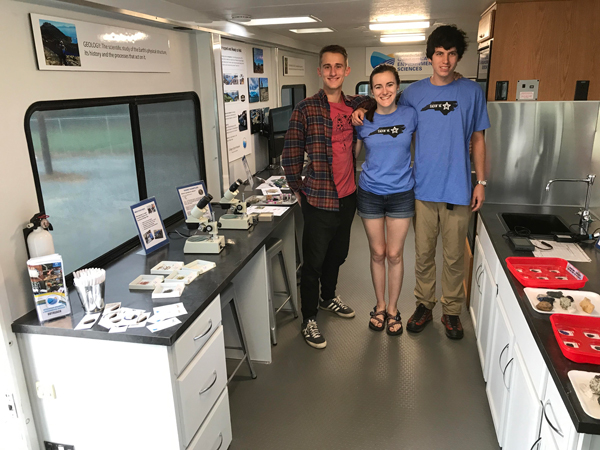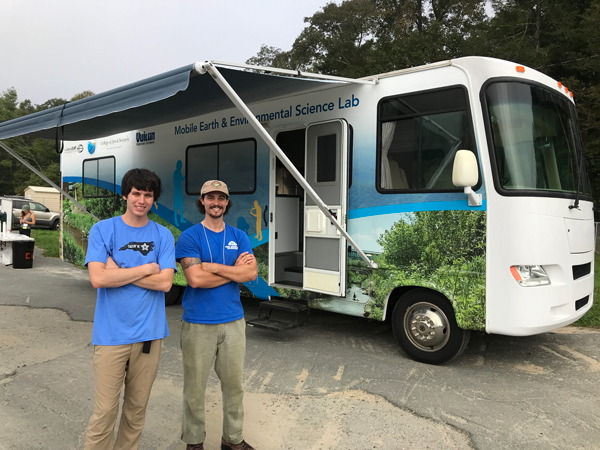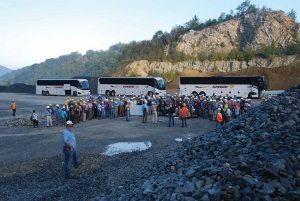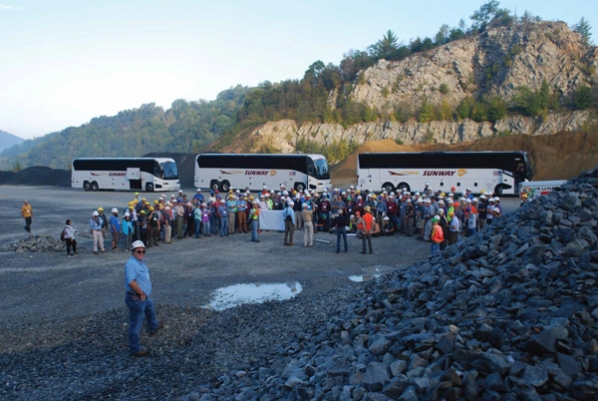The Carolina Geological Society’s 79th annual meeting took place in the high country in October with 200 geologists in attendance. The group took two days to tour local businesses, Vulcan Materials Boone Quarry and Sky Valley Zip Tours in Blowing Rock led by Dr. Ellen Cowan and Dr. Andrew Heckert, both professors in the Department of Geological and Environmental Sciences at Appalachian State University and Keith Seramur, adjunct professor in the department and owner of Seramur and Associates.
A major portion of the trip focused on areas affected by the debris flows triggered by rainfall from the August 1940 tropical cyclone, including the Stony Fork Community to see first-hand the geological record of these landslides. The meeting also highlighted examples from the landslide mapping program that was conducted by the N.C. Geological Survey in Watauga Country after the hurricanes in 2004.
The Carolina Geological Society was founded in 1937 with the principal activity of the Society being an annual field trip and membership meeting each Fall. The purpose of the Society is to promote the geosciences, especially within the states of North and South Carolina; promote and encourage study and research in the schools and colleges in these states and a spirit of friendship and cooperation among earth scientists.
At the Vulcan Materials Boone Quarry geologists examined bedrock and structures related to slope stability along the Linville Falls and Boone faults. Sky Valley served as a lunch stop and an opportunity to walk along Flannery Fork, a headwaters tributary to the New River.
Appalachian State University served as a destination on the trip including the Fred Webb Jr. Outdoor Geology Laboratory on campus near the Rankin Science Building. At this stop the participants examined this unique educational resource featuring boulder-sized pieces of bedrock gathered from across the Blue Ridge, throughout North Carolina and five other states.
The Appalachian Mobile Earth and Environmental Science Laboratory also made several appearances during the event. Participants were invited to take a look inside this new outreach vehicle and learn more about how it will be used to provide earth and environmental science education to schools and informal learning centers across western North Carolina. Geological and Environmental Sciences majors Annie Klyce, Brandon Yokeley and Anthony Hengst helped showcase examples of hands-on activities that will be used at upcoming outreach events. The "Geobago" is the result of a collaboration between the department, the College of Arts and Sciences and Vulcan Materials Company led by Dr. Andrew Heckert and Marta Toran, faculty members of the Department of Geological and Environmental Sciences.
The 200 attendees included geoscience and environmental professionals from across the Carolinas as well as students from many universities. Licensed professionals will be using the trip as part of their annual continuing education.
Additional field trip leaders included: Kevin Stewart (UNC-Chapel Hill), Rick Wooten (N.C. Geological Survey), Jesse Hill (UNC-Chapel Hill) and Anne Witt (V.A. Division of Mineral Resources). Four senior Geology majors from Appalachian, Neeshell Bradley-Lewis, Emma Myrick, Jacob Pratt, and Brandon Thomas, also assisted with the event. All the logistics were arranged by Tyler Clark the secretary-treasurer of the Carolina Geological Society.

Geologists investigate the slopes of Rich Mountain off Highway 421 in Zionville.

The field trip included a visit to the Fred Webb, Jr. Rock Garden at Appalachian.

Dr. Kevin Stewart from UNC-CH lectures about the Boone Fault along Highway 321.

Field trip participants hike on the western slopes of Rich Mountain near Zionville.

Dr. Ellen Cowan from Appalachian State describes the landscape behind her to field trip participants in Zionville.

Geological and Environmental Sciences undergraduate students Anthony Hengst, Annie Klyce and Brandon Yokeley in the Mobile Earth and Environmental Science Laboratory - the Geobago - with samples and microscopes.

Undergraduate Geological and Environmental Sciences students Brandon Yokeley and Jacob Pratt outside the Geobago.
###
About the Department of Geological and Environmental Sciences
Located in Western North Carolina, Appalachian State University provides the perfect setting to study geological and environmental sciences. The Department of Geological and Environmental Sciences provides students with a solid foundation on which to prepare for graduate school or build successful careers as scientists, consultants and secondary education teachers. The department offers six degree options in geology and two degree options in environmental science. Learn more at https://earth.appstate.edu.
Oct. 17, 2018
Ellen Gwin Burnette
BOONE, N.C.

